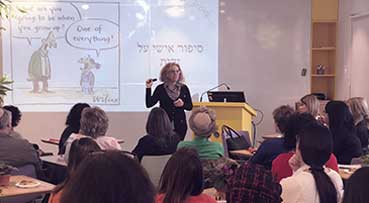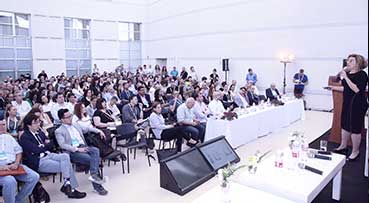The paradox of lifetime learning – we are told it is important, but we are not measured on learning, we are measured on what we know and what we do with that knowledge. It takes discipline to put aside time & resources for lifetime learning, knowing that without it we will not really be able to continue doing…
Graduation ceremonies have wrapped up and the new college and university graduates around the world deserve to be proud of their accomplishment. For those I addressed on their very special day, I recommended they remember their degree bought them tools and capabilities, but if they think it also bought them a profession, they will be best served by adding an expiration date to it. And if that profession is in the world of technology, the number of years to expiration should be counted on one hand.
Because the world is changing so quickly that on the day you graduated probably most of the answers you studied are no longer relevant. If you’re lucky, the questions still are but are also likely to change soon. Which is why knowing to know what you need to know, what you need to ask is much more important than knowing the answers. And knowing how to identify the gaps you have, and how to get them filled, and then knowing how to implement what you learned in new places and situations, those will be the skills you really need to retain.
With responsibility to the work comes the responsibility to ensure we are up for it…
In a future where the only constant is change, we will all need new capabilities and tools to work and develop. In the new world of work we, the workers, will have much more space and opportunity because manager directives and job definitions will no longer be there for us to fall back on and remove the need and the responsibility to understand and know enough to define what we need to be working on. New ways of working will include flexibility and responsibility to the work, to results, to impact, to making a different. And with these comes the responsibility to ensure we are up for all this…
Mahatma Gandhi is quoted saying “Live as if you were to die tomorrow. Learn as if you were to live forever.” That has never been more true than in this period, but it does suggest that the idea of learning over your entire life is not new. In 1979 Allen Tough researched adult learning and wrote that adults take upon themselves learning projects to gain knowledge, skills or even change attitudes and behaviors. According to this research, we do this so we can “make a good decision, build something or carry out some task related to one’s job, home, family, sport or hobby.” And in doing so “we seek help from acquaintances, experts and printed resources.” That was 1979, we did not have access to any information we needed at any given moment.
We can no longer separate between the time and place for learning (School, University, Classes) and the time and place for implementing these learnings (Work, Hobby). In an excellent article on Lifelong Learning, Gerhard Fischer reminds us that we are flooded with more information than we can handle, and tomorrow’s workers will need to know far more than any individual can retain. This article was written in the year 2000, before the iPhone, Android, Tablets and Apps.
From Push to Pull
Today, more than ever, we must view learning as a responsibility we owe ourselves ensuring happens all the time, both planned and official, as well as unplanned and unofficial. We need to move from “push” to “pull” learning both as individuals, as well as organizations. The latter need to move from learning models where we help employees find answers, to those where employees have access to the information they need when they need it, through various channels.
In the past we were used to someone else being responsible for our learning – school, university, our employer. And we were used to thinking of learning as a path to obtaining a profession, a certification, and then onwards to a job. Once on that job, we learned what we lacked and the intent was to “fix” those gaps we had so we can move on to the next level, the next job, up the ladder.
In this day and age we are responsible for our own learning.
And how we learn is transforming to be a continuous journey on which we pull the knowledge we need at any given time and place. Learning is no longer limited to a course with a classroom and a teacher. Today’s young generations are used to obtaining knowledge via search tools. High quality material, open for everyone to access via the web will quickly become the new normal. Learning is a natural part of growth and development, an integral part of career. We need to make time for it, set aside resources, give it our attention. It is of no less importance than clearing our inbox or working through our to-do list. In fact, growth and development should be part of that to-do list and last over our entire career.
And yet, we don’t all do this, at least not in a structured manner. Why is that?
In a wonderful article in HBR, Learning Is the Most Celebrated Neglected Activity in the Workplace the author Gianpiero Petriglieri shines a light on the fact that while organizations say learning is important for the success of the individual and the organization, they don’t really care if we’ve given in any time. We are not measured on our learning, we are measured on what we already know, and on what we deliver. But you already know that without learning we might not know or deliver and eventually, results will suffer. And this will then become be your responsibility for your career and for your organization.
So how do we do it?
How do we ensure we pause the day to day and make time for learning?
We already know this is not about signing up for a class. Its about constructing an ongoing learning journey from planned learning events as well as unplanned opportunities. It’s a journey, with no destination.
Planned learning can include structured training, on the job or out of it, many times through an expert pushing the learning to the learner in a structured way. But it can also include requesting someone to mentor us on a given process. And it also includes knowing how to receive feedback, even actively seeking feedback including feedback about our contribution to the organization. Not what we did, but what was the impact, the result. Try to find a mentor who is outside your regular management lines, someone you do not report into, who is experienced and can influence your personal and professional development longer term.
Unplanned learning means putting ourselves in situation which require us to deal with what we need to learn, exercise “muscles” we don’t have, take on challenges which require us to work through unfamiliar territory. In a previous post, when was the last time you thought about resigning?, we discussed careers with the T shape, ones that include depth of knowledge but also breadth of other areas of knowledge. We control our own development and it needs to grow us beyond our current role, profession and certainly beyond our current organization. If we understand our objectives and purpose, and if we define for ourselves and time and a place and a path for developing our career, we are sure to discover unending opportunities.
Because the changes around you are already here and the only question is not whether they will affect you, but how soon it will happen, and will you be ready?

![large-AX1A2125-2[1]](https://niritcohen.com/wp-content/uploads/elementor/thumbs/large-AX1A2125-21-pnzedcs72atx5aeurqytqdiihxixlq02re9mlz805s.jpg)






